初中英语词和词组辨析(形近义异)
初中英语常用词词义用法辨析

初中英语常用词词义及用法辨析it is a pleasure不过说某事是一件令人快乐地事it is my pleasure是说为你做某事我很快乐,用于回答 thank you about, onabout 与on都能够作" 对于 " 讲 ,但却有所不一样,比如:This book is about physics. 这是一本对于物理学地科普读物.This book is on physics.这是一本物理学方面地专著.after, in受中文地影响,这个介词常常被误用.当你要表达在一段时间内某个动作能够达成时用 in, 而不可以用 after,由于 after 是指在某一时间以后.比如:This work will be done in two days.即表示在两天内这一工作必定会做完.而如用了示在两天以后 ,达成地时间是不确立地.,必定要after,即表after, behindafter 多用于表示次序地前后,比如:She walked in the line after Tom. 或用来表示 "追赶 ",表示一种动向,如:He ran after Mary. 而 behind 多用于重申先进与落伍,如:She is much behind the other girls in sewing. 或许用于表达"迟于 ", 如:The train was ten minutes behind the time table. 或许与表示静态地动词连用She hid herself behind the flowers.,如:against, foragainst 意为 " 反对 "、 " 不同意" ;而for则意为" 赞同 ", 为其反意词.如:Are you for or againstthe plan?already, yetalready 多用于必定句中,比如:The students have already finished the work. 而yet 则多用于疑问句与否认句中,如:Have you finished it yet? I haven't finished it yet.also tootoo 都可用在必定句中表示 also 与"也 ",但 also 往常用于be 动词或神态动词以后,如:I can also do it myself. 而 too一般放于句尾 .比如 :I'll attend his class, too.another, other, the other, the others, others要注意英语中another, other, the other, the others, others 地不一样用法 ,现分别说明以下:another 作形容词其意为:泛指地另一个或再一个,别地 ,近似地 .一般在句中作定语is not good enough, please show me another one. another还能够作为代词用,如:One student said: "I want to play baskball."another said : "I want to play football."other 作形容词其意为" 泛指其他地 ,别地 ".如:I have other books besides these. Ask some other people please.,如 : Thisthe other 则为特指,作形容词时后来面可接单数或复数名词,如:She has two flowers. One is white, the other one is yellow. ( 特指 ,单数 >There are fifty students in our class, twenty five are boys, the other students are girls. (特指,复数 >但当 the other 作为代词时 ,它代表地能够是单数,也能够是复数,如:He has a book in one hand, and a pen in the other. (单数 >There are some people in the room. Four are girls, the other( 复数 >are boys.要注意地是当the other 作主语时 ,后来面地谓语动词要视详细状况而定,它可能是单数,也可能是复数 .others 则只好作代词,其意为other ones即为:泛指某些,某一部分人或物,如:Each of us must think of others.the others 只好作为代词,它是特指某一些人或物,如:I know only one or two of the students 。
初中英语重点短语辨析

初中英语重点短语辨析1. be made of / be made fromⅠ. be made of “由……制成/造”成品看得出原料。
如:The desk is made of wood. 这张桌子是木头制成的。
Ⅱ. be made from “由……制造/成”成品看不出原料。
如;Paper is made from rags.纸是由破布做的。
(已看不出原料)2. be pleased with/ at/ toⅠ. be pleased with “对……人/物,感到满意”介词with后接人或物。
如:① Both Mark and her mother were pleased with the girl. 马克和他妈妈都有喜欢这个女孩。
② I wasn’t very pleased with / at my exam results. 我对自己的考试成绩不太满意。
Ⅱ. be pleased at “对……某事/物,感到满意”。
介词at 常与事物搭配使用。
He was very pleased at the news.他对这个消息感到很满意。
Ⅲ. be pleased to “乐意……;因……而高兴”。
to 不是介词,而是小品词。
后接动词原形。
如:① I shall be pleased to go. 我将乐意去。
② We are quite pleased to be working in this country. 能在这个国家工作,我们是十分高兴的。
3. be sure of/ be sure to do/ be sure thatⅠ.be sure of “确信对……有把握”后接名词、代词或动词-ing 形式,表对客观事物有肯定的认识和判断,主语必须是人。
如:① As David joined our team, we are sure of winning the game this time.由于David参加了我们的球队,我们这次有把握取胜。
初中英语132个同义词辨析详解

初中英语132个同义词辨析详解_学习方法网---------------------------------------今天小编为大家整理了一篇有关初中英语同义词辨析详解的相关内容,以供大家阅读。
更多信息请关注学习方法网!xerox,copy,duplicate这些动词均有“复英复制”之意。
xerox:指用静电复印或用静电印刷术复制。
copy:着重模仿者的有意识行为或模仿得尽可能接近原件。
duplicate:指对原件进行复制或复印,侧重结果与原件一模一样。
yearn,long,thirst这些动词均含“渴望”之意。
yearn:通常指急迫不安地渴望或向往,着重怀有柔情或热情。
long:指诚心诚意地渴望某事或物。
thirst:原义指对食物或饮料的渴求,引申指全力以求。
young,youthful,juvenile,adolescent这些形容词均有“年轻的,年幼的”之意。
young:强调年龄小,处于生长的前期。
youthful:褒义或贬义均可用。
指具有青年人的外貌或年轻人应具有的品格。
juvenile:较正式用词,一般12岁以下的少年,着重其生理和智力上的不成熟。
adolescent:指13至16岁左右处于青春期的人,尚不成熟。
youth,teenager,adolescent,juvenile这些名词均有“年轻人,青少年”之意。
youth:现在几乎专指男青年,尤指10多岁到20多一点的男青年,但作为集合名时间男女青年都可指。
teenager:主要指13岁到19岁之间的青少年,强调这个年龄段的人的本身特点。
adolescent比teenager正式,侧重年龄。
juvenile:指青少年,系法律上的常用词。
zeal,enthusiasm这两个名词均含“热情”之意。
初中英语外研版教材语法专项训练《形容词和副词》中考单词词义辨析总复习
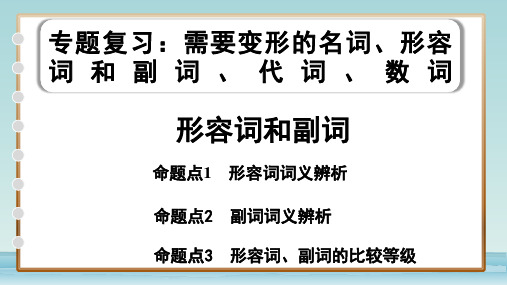
—Take care. I feel ____B____ the same.
A. hardly
B. exactly
C. seriously
D. properly
22. My uncle always goes swimming on weekends, but ___C_____ he also
plays basketball.
C. politely
D. recently
20. We should manage our pocket money ____A____ and use it to do
something meaningful.
A. wisely
B. usefully
C. healthily
D. slowly
21. —I'm sure I'll miss you all.
3. (2020 贵港 37 题)—How excellent the basketball players are!
—Yes. Their coach is always ____A____ with them. They practice really
hard every day.
A. strict
词义 以前 早地 晚,迟 立即,立刻
时间副词(词组) at fir st at last just now at once
the classroom.
A. even
B. rather
C. hardly
D. almost
满分点拨
分析北部湾经济区近 4 年真题可知,副词词义辨析为必考点,均在 单选和完形中考查,主要考查以-ly 结尾的副词词义辨析(5 次)、频度副 词词义辨析(2020.36)、程度副词(2020.50)和副词 back 的固定搭配 do sth. back in return (2018.50)。
初中英语近义词、同义词、词组、短语辨析大全 同义词辨析 第12组
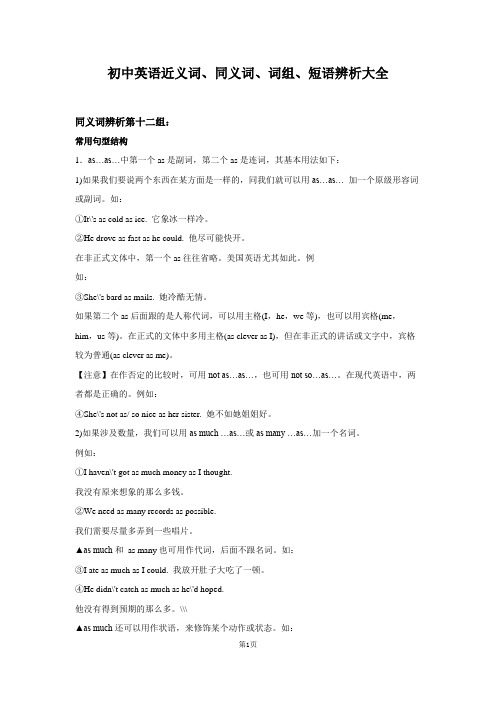
初中英语近义词、同义词、词组、短语辨析大全同义词辨析第十二组:常用句型结构1.as…as…中第一个as是副词,第二个as是连词,其基本用法如下:1)如果我们要说两个东西在某方面是一样的,同我们就可以用as…as… 加一个原级形容词或副词。
如:①It\'s as cold as ice. 它象冰一样冷。
②He drove as fast as he could. 他尽可能快开。
在非正式文体中,第一个as往往省略。
美国英语尤其如此。
例如:③She\'s bard as mails. 她冷酷无情。
如果第二个as后面跟的是人称代词,可以用主格(I,he,we等),也可以用宾格(me,him,us等)。
在正式的文体中多用主格(as clever as I),但在非正式的讲话或文字中,宾格较为普通(as clever as me)。
【注意】在作否定的比较时,可用not as…as…,也可用not so…as…。
在现代英语中,两者都是正确的。
例如:④She\'s not as/ so nice as her sister. 她不如她姐姐好。
2)如果涉及数量,我们可以用as much …as…或as many …as…加一个名词。
例如:①I haven\'t got as much money as I thought.我没有原来想象的那么多钱。
②We need as many records as possible.我们需要尽量多弄到一些唱片。
▲as much和as many也可用作代词,后面不跟名词。
如:③I ate as much as I could. 我放开肚子大吃了一顿。
④He didn\'t catch as much as he\'d hoped.他没有得到预期的那么多。
\\\▲as much还可以用作状语,来修饰某个动作或状态。
如:⑤You ought to rest as much as possible. 你应当尽量多休息。
初中英语同义词辨析
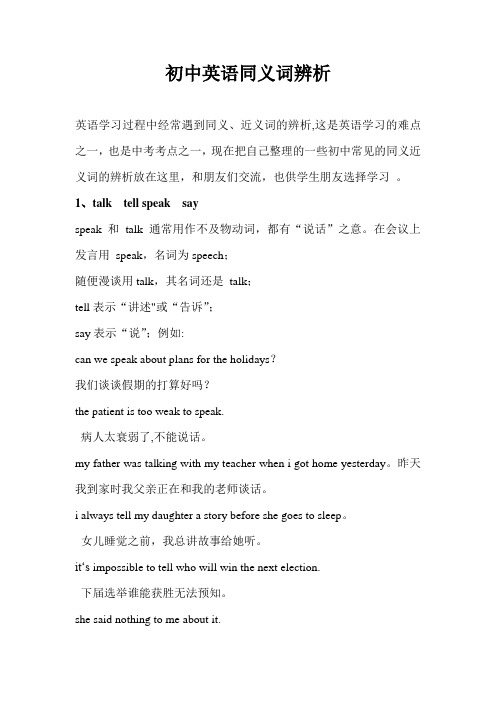
初中英语同义词辨析英语学习过程中经常遇到同义、近义词的辨析,这是英语学习的难点之一,也是中考考点之一,现在把自己整理的一些初中常见的同义近义词的辨析放在这里,和朋友们交流,也供学生朋友选择学习。
1、talk tell speak sayspeak 和talk 通常用作不及物动词,都有“说话”之意。
在会议上发言用speak,名词为speech;随便漫谈用talk,其名词还是talk;tell表示“讲述"或“告诉”;say表示“说”;例如:can we speak about plans for the holidays?我们谈谈假期的打算好吗?the patient is too weak to speak.病人太衰弱了,不能说话。
my father was talking with my teacher when i got home yesterday。
昨天我到家时我父亲正在和我的老师谈话。
i always tell my daughter a story before she goes to sleep。
女儿睡觉之前,我总讲故事给她听。
it‘s impossible to tell who will win the next election.下届选举谁能获胜无法预知。
she said nothing to me about it.关于这一点,她什么也没有对我讲.*speak 当及物动词用时,宾语一般是语言或词语之类的词。
如: does anyone speak english here?这儿有人会说英语吗?2、good well nicegood 形容词,好的,合适的,新鲜的,擅长的。
well 作形容词时,指"(身体)健康的”;还可用作副词,修饰动词。
nice形容词,美好的,令人愉快的,可爱的,特指取悦感官的事物。
she is good at english。
她擅长英语。
初中英语经典短语及同义词组

初中英语同义词组1.arrive in/at=get to=reach2.be fine=be well=be OK3.be from=come from4.be in=be at home5.be full of=be filled with6.be late for=come late for7.be on a visit to= visit8.be able to=can9.be away=be out10.be busy doing sth.=be busy with sth.11.be pleased=be glad=be happy12.buy sb. Sth.=buy sth. to sb13.be up=get up14.catch up with=keep up with15.catch a bus=take a bus16.catch a cold=have a colde into=step intoe on=come alonge down=get down20.do well in=be good at21.do the shopping=go shopping22.drop off=get off23.enjoy doing sth.=like doing sth.24.have a good time=enjoy oneself25.fall down=fall off26.get the telephone=answer the telephone27.give sb.sth.=give sth.to sb.28.give sb.the message=give the message to sb.29.give sb. a talk=give a talk to sb.30.give a concert=have a concert31.get on well with sb.=be good to32.give…a call=give…a ring33.go down=go along34.go for a swim=go swimming35.go on doing sth.=go on with sth.36.go up=go along37.go to sleep=get to sleep=fall asleep38.have a look (at)=look at39.have a swim=go swimming40.have got=have41.hear from=receive a letter from=have a letter from=get a letter from42.help sb with sth=help sb to do sth43.hold a meeting=have a meeting44.hold on=wait a minute45.hurry up=be quick46.knock at=knock onst from…to=be from…to48.like doing sth=like to do sth49.look out=be careful50.love to do sth=like to do sth51.make up one’s mind to do=set one’s mind to do52.pay for=spend on53.prefer…to=like b etter than54.ring up=call sb55.send for sb=ask sb to come56.show sb sth=show sth to sb57.take care of=look after58.take exercise=do sport59.take a message=leave a message60.think about=think of61.teach oneself=learn all by oneself62.turn off=turn down63.turn right at the…crossing=take the …turning on the right64.walk on=go on65.walk to=go to …on foot66.walk along=go along67.at school=in the school68.a lot of=lots of69.a lot=very much70.a quarter past two=two fifteen71.at times=sometimes72.at last=in the end=finally73.a bit=a little=a few74.a moment ago=just now75.at once=right now76.at noon=in the middle of a day77.at that moment=at that time=just then78.at the moment=at the same time79.at the doctor’s=in the doctor’s office80.all over the world=across the world=around the world=in the world81.a moment later=later on82.after a while=a moment later83.all the same=all the time84.as soon as possible=as quick as possible85.in line=in a queue86.in the southern part of=in the south of87.in the day=in the daytime88.much of China=many places of China89.more than=over90.no longer=not…any longer=no more=not any more91.not far from=near to92.North China=the north of China93.of course=certainly94.plenty of=quite a few=a lot of=lots of=large number of=a great many of=a good deal of95.two and a half years=two years and a half初中英语同义词组1. arrive in/at=get to=reachI arrived at the airport at 10.=I reach the airport at 10.注意这里不能用arrive in2. be fine=be well=be OKI’m fine=I’m well.=I’m OK.3. be from=come fromHe is from China.=He comes from China.4. be in=be at homeHe is in.=He is at home.同理:be out= be not at home5. be full of=be filled withThe bottle is full of orange.=The bottle is filled with orange.6. be late for=come late forI’m sorry, I’m late for the meeting.=I’m sorry, I come late for the meeting.7. be on a visit to= visitHe is on a visit to China.= He is visiting China8. be able to=canHe was able to ride a bike at the age of 5.=He could ride a bike when he was 5.9. be away=be out=be not at home10. be busy doing sth.=be busy with sth.He is busy doing his homework.=He is busy with his homework.11. be pleased=be glad=be happyThe coach was pleased with their performance.=The coach was glad with their performance.=The coach was happy with their performance.12. buy sb. Sth.=buy sth. to sbMy mother bought me a book.=My mother bought a book to me.13. be up=get upBe up, Tom!=Get up, Tom.14. catch up with=keep up withI can catch up with others.=I can keep up with others.15. catch a bus=take a busCan I catch a bus?/Can I take a bus?16. catch a cold=have a coldOh, no! You’ve caught a cold.=Oh, no! You’ve had a cold.17. come into=step intoHe came into the classroom.=He stepped into the classroom18. come down=get downCome down! That’s dangerous.=Get down! That’s dangerous.19. do well in=be good atHe does well in swimming.=He is good at swimming.20. do the shopping=go shoppingI’ll do the shopping.=I’ll go shopping.21. drop off=get off22. enjoy doing sth.=like doing sth.I enjoy reading.=I like reading.23. have a good time=enjoy oneselfWe had a good time at the party.=We enjoyed ourselves at the party.24. fall down=fall offI fell down.=I fell off the bike.25. get the telephone=answer the telephoneI got the telephone.= I answered the telephone.26. give sb.sth.=give sth.to sb.27. give sb.the message=give the message to sb.28. give sb. a talk=give a talk to sb.29. give a concert=have a concertThey gave a concert.=They had a concert.30. get on well with sb.=be good toI got on well with my neighbors=I’m good to my neighbors.31. give…a call=give…a ringI gave a call to you.=I give you a ring.32. go down=go along33. go for a swim=go swimming34. go on doing sth.=go on with sth.35. go up=go along36. go to sleep=get to sleep=fall asleep37. have a look (at)=look at38. have a swim=go swimming39. have got=have40. hear from=receive a letter from=have a letter from=get a letter from41. help sb with sth=help sb to do sth42. hold a meeting=have a meeting43. hold on=wait a minute44. hurry up=be quick45. knock at=knock on46. last from…to=be from…to47. like doing sth=like to do sth48. look out=be careful49. love to do sth=like to do sth50. make up one’s mind to do=set one’s mind to do51. pay for=spend on52. prefer…to=like better than53. ring up=call sb54. send for sb=ask sb to come55. show sb sth=show sth to sb56. take care of=look after57. take exercise=do sport58. take a message=leave a message59. think about=think of60. teach oneself=learn all by oneself61. turn off=turn down62. turn right at the…crossing=take the …turning on the right63. walk on=go on64. walk to=go to …on foot65. walk along=go along66. at school=in the school67. a lot of=lots of68. a lot=very much69. a quarter past two=two fifteen70. at times=sometimes71. at last=in the end=finally72. a bit=a little=a few73. a moment ago=just now74. at once=right now75. at noon=in the middle of a day76. at that moment=at that time=just then77. at the moment=at the same time78. at the doctor’s=in the doctor’s office79. all over the world=across the world=around the world=in the world80. a moment later=later on81. after a while=a moment later82. all the same=all the time83. as soon as possible=as quick as possible84. in line=in a queue85. in the southern part of=in the south of86. in the day=in the daytime87. much of China=many places of China88. more than=over89. no longer=not…any longer=no more=not any more90. not far from=near to91. North China=the north of China92. of course=certainly93. plenty of=quite a few=a lot of=lots of=large number of=a great many of=a good deal of94. two and a half years=two years and a halfthink up=come up withgive out=hand outuse up=run out ofcall up=ring upinstead of=in place oftake after=likeset up=eatablishbe angry with=be mad oflose one's way=get losetry one's best=do one's bestgo to sleep=get to sleep=fall asleepin the end=at last=finally=at the end ofmake a decision=decide to dobe surprise at=be amazed ateven thought=even ifno long=not...any longertake pride in=be pround ofgive up=stop doingworry about=be worried aboutbe confident of doing=have confidence in doingnot....in the slightest=not at allplenty of=lots of=a lot ofget along with=get on withbe anxious about=be worried abouton diaplay=on showwhatever=no matter whatexpect sb. to do=wish sb.to dostay away from=keep away fromconsider doing=think about doingcontinue doing=go on dingtake after=be similar tobe filled with=be full ofat once=right awaydonate...to=give away...tobe used for=be used to doby accident=be chance同义句转换训练是初中英语学习的重点,也是学生学习的难点,同义句转换虽不是中考的专题了,但它可以出现在听力测试、选择题、写作中。
英语九年级下易混淆词组辨析训练(合格)
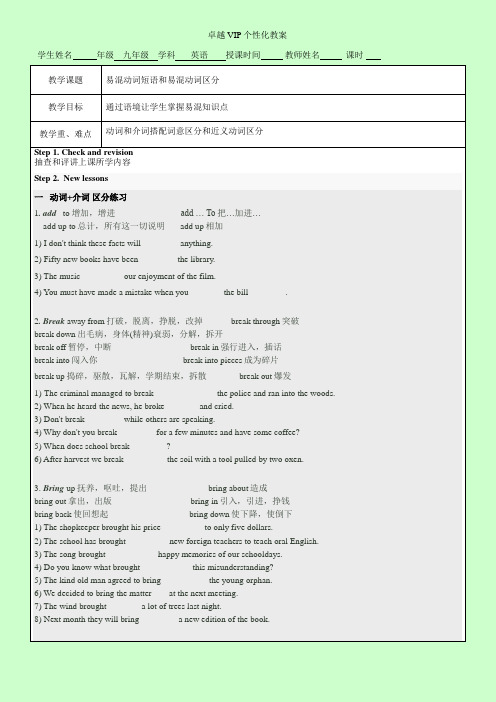
卓越VIP个性化教案学生姓名年级九年级学科英语授课时间教师姓名课时教学课题易混动词短语和易混动词区分教学目标通过语境让学生掌握易混知识点教学重、难点动词和介词搭配词意区分和近义动词区分Step 1. Check and revision抽查和评讲上课所学内容Step 2. New lessons一动词+介词区分练习1.add to增加,增进add … To把…加进…add up to总计,所有这一切说明 add up相加1) I don't think these facts will ________ anything.2) Fifty new books have been ________ the library.3) The music _________ our enjoyment of the film.4) You must have made a mistake when you _______ the bill ________.2.Break away from打破,脱离,挣脱,改掉 break through突破break down出毛病,身体(精神)衰弱,分解,拆开break off暂停,中断 break in强行进入,插话break into闯入你 break into pieces成为碎片break up捣碎,驱散,瓦解,学期结束,拆散 break out爆发1)The criminal managed to break _______ ______ the police and ran into the woods.2) When he heard the news, he broke _______ and cried.3) Don't break ________ while others are speaking.4) Why don't you break ________ for a few minutes and have some coffee?5) When does school break ________?6) After harvest we break _________ the soil with a tool pulled by two oxen.3.Bring up抚养,呕吐,提出 bring about造成bring out拿出,出版 bring in引入,引进,挣钱bring back使回想起 bring down使下降,使倒下1) The shopkeeper brought his price _________ to only five dollars.2) The school has brought _________ new foreign teachers to teach oral English.3) The song brought ___________ happy memories of our schooldays.4) Do you know what brought ___________ this misunderstanding?5) The kind old man agreed to bring __________ the young orphan.6) We decided to bring the matter ___ at the next meeting.7) The wind brought _______ a lot of trees last night.8) Next month they will bring ________ a new edition of the book.4. Call on号召,拜访〔某人〕 call at拜访、参观〔某地〕call for去叫某人, 要求, 需要 call up使回忆起, 征召入伍call in召集,请某人来 call out大喊,高叫 call off取消,不举行1) Doctors are often called _____ in the middle of the war.2) Please wait for me at home. I'll call _______ you at your house at seven tonight.3) The trains calls _______ several big cities between Beijing and Guangzhou.4) He called her name __________, but she didn't answer.5) The sports meet was called ____ on account of the rain.5. Come about发生,出现 come down下跌,落,降,传下来come in进来 come into (sight/being/existence/use/notice/effect) come on来临/ 快点 come over走过来come to到达 (an end/an agreement/a stop)苏醒,合计,总共是come up发芽,走近 come across偶然碰到come back回想起 come from来自,源自1) I come _________ the book I lent you last month.2) How did it come _________ that you both got lost? I thought you had a map.3) It suddenly came _________ to me where I had seen the boy before.4) Come __________ now, or else we shall be late.5) He came __________ me like a tiger.6) The price of petrol has come _________ since the beginning of this year.7) The word came __________ use many years ago.8) When the examination result came _________, he had already got a job.9)The bill came __________ over a thousand dollars.10) I sowed the seeds over a month ago, but they haven't come __________ yet.6.Cut across抄近路 cut down砍倒,削减cut off切断,割掉,断绝关系 cut up连根拔除,切碎cut through剪断,凿穿 cut out删〔省〕掉,戒掉 cut in插嘴1) Don't cut ___ this tree. It will be very shady in summer.2) You must cut ________ the number of cigarettes you smoke, or it will cause illness.3) We decided to cut _________ the moor〔旷野〕 to the village.4) Cutting the tree ____ means cutting the tree into pieces.5) The electricity was cut ___________ when the lady refused to pay the bill.6) We were having a pleasant conversation when Tom cut __________.7. Die of (disease/hunger/grief/old age)死于〔疾病,饥饿,寒冷,情感原因〕die from死于〔意外事故、情形〕 die out绝种die away渐渐消逝 die down(炉火)渐熄 die off逐一死去8.Fall behind落后 fall over one's feet 跌跤 fall down掉下,跌倒 fall back撤退,后退1) Babies often fall _____ when they are learning to walk.2) Our team seems to have fallen __________ the others.3) As soon as the enemies fell __________, the people returned to their village.4) She fell__________ the bench and had her leg broken.9.9. Go in for从事,喜爱,参加 go through通过,经受go over复习,检查 go up〔价格〕上涨,建造起来go after追捕,追赶 go against违反go ahead先行,开始吧,问吧,说吧 go away离开go by时间过去 go down下沉,降低,〔日、月〕西沉go on(with)继续进行 go with相配,陪同go without没有,缺少 go out外出,熄灭go all out全力以赴 go off爆炸,进行,变坏,断电,停止供给go back on背约,食言 go beyond超出1) Many new factories have gone __ in the past few years.2) Rents have gone __________ greatly recently.3) Many years have gone ___________ since we first met.4) Let's continue our journey until the sun goes _______.5) His actions went ___________ the will of the people,6) I can't do it, for it goes ___________ my duty.7) Over 100 students went ____________ this entrance examination.8) The bomb went ____________ and killed ten people.9) The buyer went ___________ the car carefully before reaching a decision.10) This tie doesn't go ___________ my blue shirt.11) If you think you can solve the problem, go ______.12) Many students went __________ playing basketball.10.Get down下来,记下,使沮丧 get down to致力于,专心于get on进展,进步,穿上,上车 get off脱下,下车get in收集,插〔话〕 get away逃跑,逃脱,去休假get over忘记,越过,克服,从疾病中恢复 get along with进展,相处get up起床 get through打通,完成,通过get round消息传开 get close to sth. 接近,几乎get into (trouble) 陷入困境中 get to (know) 逐渐了解到get back取回,收回 get out 出去1) She spoke so fast that I couldn't get ____ what he said.2) We will find ways to get _________ difficulties.3) The story has got __________, and everyone knows about it.4) When I get _________ with the report, i'll go to the cinema.5) After a delicious meal the two men got __________ to business.6) Don't always get __________ a word when others are speaking.7) It took me a long time to get ___________ such an unpleasant experience.11.Give away赠送,泄露,出卖 give out发出,疲劳,分发,公布give off发出〔光、热、气体〕 give in (to sb.) 屈服 give up放弃,让〔座位〕1) His accent at last gave him __________.2) The liquid gave ________ a strong smell.3) The headmaster gave ___________ the names of the prize-winners.4) The soldiers gave _________ the town to the enemies.5) Who will help me to give the books ___________?6) Don't believe in those who give his friends ________.7) After a long walk, my strength gave ____________.12.Hand in交上,提交 hand out分发 hand down流传,遗传13. Hang about闲逛 hang up挂14. Hold back阻止,隐瞒 hold up举起,使停顿hold on别挂,等,坚持 hold out持续,坚持,伸出hold down控制,镇压1) I'm sure he is holding something _________.2) She managed to hold ______ her emotion until her guests had left. Then she cried.3) Tell him to hold ________ a moment. I'll come soon.4) Our food supply won't hold _________ for more than a few days.5) The train was held ________ as a result of the floods.6) These measures helped to hold ___________ the city's population.7) Hold ___________ your left arm, please.15.Keep up (courage, English, spirits)保持, keep up with跟上keep off (grass)不接近,离开 keep away from避开,不接近,离…远远的keep out of keep to (rules, promise)坚持,遵守keep on继续,坚持下来 keep back阻止,留下,隐瞒,扣下keep from克制,阻止1) The angry lady told the strangers to keep ________ from her.2) I can hardly keep ________ my tears after hearing his words.3) Only pride kept her __________ bursting into tears.4) I can scarcely keep __________ asking him what he has done.5) "Don't touch me," screamed the woman, "Keep __________!"6) Keep _________ until you succeed.7) Keep _________ your courage, and you'll succeed in the end.8) The thick coat can keep the cold ___________.9) Always try to keep ___________ the rules when you play a game.10) I can't keep ________ with everything you're doing.16.Knock at/on敲 knock into撞到某人身上knock down撞倒 knock out of把…敲出knock over撞倒 knock off停止工作,休息1) The boxer soon knocked his opponent _________.2) The office stuff knocks _________ at six every day.3) Try knocking __________ the window and see if there is anyone indoors.4) He was so absorbed in his book that he knocked __________ the car parked there.17.Leave for离开前往 leave out删去,遗漏leave behind遗留,忘记拿走 leave to留给,遗嘱赠于leave over遗留,剩下,延期1) "Whose name has been left __________?" demanded the teacher.2) When he died, he left all his property _____ his niece.3) He suddenly realized that he had left his umbrella ___________.4) Don't leave this matter _________ until tomorrow.5) Leave some meat ___________ for tomorrow.6) Those are questions left _________ by history.18.Look up查找,向上看 look through翻阅,浏览 look on旁观look on…As看作 look into调查 look after/ at / for 照顾/看/寻找look out(for)留神 look about / around/round四下查看look down upon瞧不起 look back upon回忆,回忆look ab. Up and down仔细打量某人 look ab in the face/eyes直视某人1) I spent two hours looking ______ the students' papers.2)Look _______! There is a big hole in front.3) He took part in the game, and the rest of us just looked ______ and cheered for him.4) The old man looked _____ upon the days of his youth.5) She was so snobbish〔势利〕that she looked __________ upon all his neighbours.6) The police promised to look __________ the case as soon as possible.7) He looked __________ but saw nobody, and he listened but hear nothing.19.Make up编造,配制,打扮,组成 make up for弥补make into / of / from 制成 make out弄懂,发现,看出,填写,开列〔清单〕make for走向,驶往,促使1) Can you make this length of cloth __________ a suit?2) I asked the driver if he was making ___________ London?3) My father made __________ a check for me to buy the camera.4) We must make the loss _________ next week./ He tried hard to make ________ forthe damage he had done.5) He made __________ a story, which I found hard to believe.6) Someone is coming, but I can't make ___________ who it is.二中考英语冲刺必记16组易混动词辨析1. used to do sth.;be used to doing sth.和be used to do sth.的区别辨析:used to do sth.表示过去常常做某事.e.g. I used to get up at six in the morning.be used to doing.表示习惯做某事,to 后的动词用-ing形式e.g. I'm used to getting up early.be used to do sth. 指被用来做什么。
初中英语中考专题复习——动词语境辨析(实义动词+近义动词+感官动词)
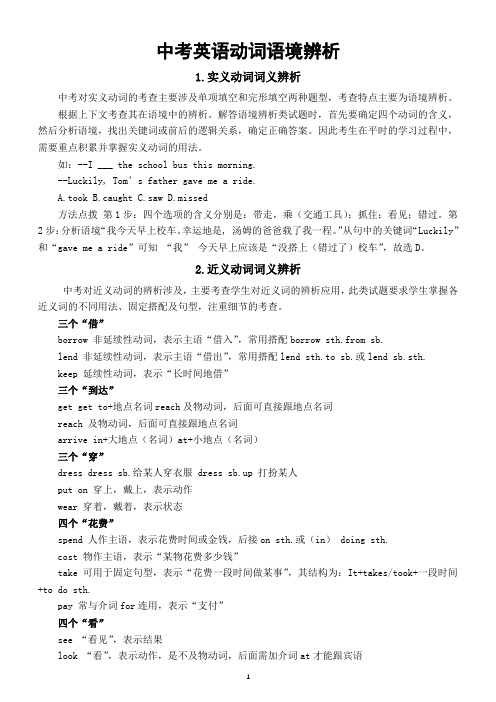
中考英语动词语境辨析1.实义动词词义辨析中考对实义动词的考查主要涉及单项填空和完形填空两种题型,考查特点主要为语境辨析。
根据上下文考查其在语境中的辨析。
解答语境辨析类试题时,首先要确定四个动词的含义,然后分析语境,找出关键词或前后的逻辑关系,确定正确答案。
因此考生在平时的学习过程中,需要重点积累并掌握实义动词的用法。
如:--I ___ the school bus this morning.--Luckily, Tom’s father gave me a ride.A.tookB.caughtC.sawD.missed方法点拨第1步:四个选项的含义分别是:带走,乘(交通工具);抓住;看见;错过。
第2步:分析语境“我今天早上校车。
幸运地是, 汤姆的爸爸载了我一程。
”从句中的关键词“Luckily”和“gave me a ride”可知“我”今天早上应该是“没搭上(错过了)校车”,故选D。
2.近义动词词义辨析中考对近义动词的辨析涉及,主要考查学生对近义词的辨析应用,此类试题要求学生掌握各近义词的不同用法、固定搭配及句型,注重细节的考查。
三个“借”borrow 非延续性动词,表示主语“借入”,常用搭配borrow sth.from sb.lend 非延续性动词,表示主语“借出”,常用搭配lend sth.to sb.或lend sb.sth.keep 延续性动词,表示“长时间地借”三个“到达”get get to+地点名词reach及物动词,后面可直接跟地点名词reach 及物动词,后面可直接跟地点名词arrive in+大地点(名词)at+小地点(名词)三个“穿”dress dress sb.给某人穿衣服 dress sb.up 打扮某人put on 穿上,戴上,表示动作wear 穿着,戴着,表示状态四个“花费”spend 人作主语,表示花费时间或金钱,后接on sth.或(in) doing sth.cost 物作主语,表示“某物花费多少钱”take 可用于固定句型,表示“花费一段时间做某事”,其结构为:It+takes/took+一段时间+to do sth.pay 常与介词for连用,表示“支付”四个“看”see “看见”,表示结果look “看”,表示动作,是不及物动词,后面需加介词at才能跟宾语watch “观看(比赛、电视等)”read “看(书、报等)”,表示阅读四个“说”speak 作及物动词时后接表示语言的名词,表示“说,讲述”say 常跟直接引语或间接引语,表示说的内容talk 是不及物动词,常跟介词to和with,意为“同……谈话”,也表示具有说话能力tell 意为“告诉”,与story连用,意为“讲故事”四个“拿”bring “带来,拿来”,表示拿到靠近说话人的地方take “拿去,带走”,表示拿到远离说话人的地方carry “扛,搬,用力移动”,没有方向fetch “去取,去拿”,表示往返拿东西四个“赢,输”lose 意为“输给”某人,固定搭配为lose to sb.fail 意为“失败”或“未做成某事”beat 意为“打败”,后接人或某支队伍win 意为“赢得,荣誉,地位,比赛等”四个“参加”join 一般指加入“党派”或“组织”并成为其中一员,如参军,入党,入团等join in 指参加竞赛、娱乐、游戏等活动take part in 指参加聚会或群众性活动attend 一般指出席会议、典礼、婚礼等四个“变化”turn 一般用于颜色的变化get 天变黑、变长或变短become 天气变暖或变冷等,表示渐变grow 形状变大或变小3.感官动词词义辨析sound 意为“听起来……”指听觉。
初中英语近义词、同义词、词组、短语辨析大全
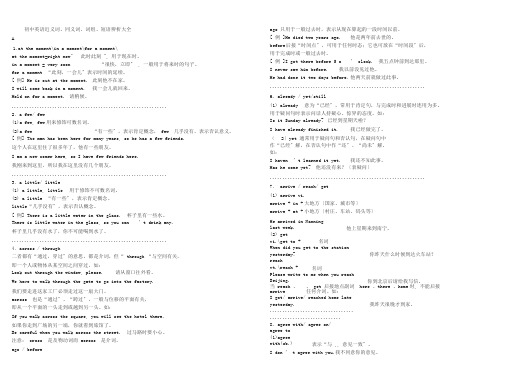
初中英语近义词、同义词、词组、短语辨析大全A1.at the moment\in a moment\for a moment\at the moment=right now" 此时此刻 ", 用于现在时。
in a moment = very soon “很快,立即〞 , 一般用于将来时的句子。
for a moment “此刻,一会儿〞表示时间的延续。
[ 例] He is out at the moment. 此刻他不在家。
I will come back in a moment. 我一会儿就回来。
Hold on for a moment. 请稍候。
.............................................................2.a few/ few(1)a few, few 用来修饰可数名词。
(2)a few “有一些〞,表示肯定概念,few 几乎没有,表示否认意义。
[ 例] The man has been here for many years, so he has a few friends.这个人在这里住了很多年了,他有一些朋友。
I am a new comer here, so I have few friends here.我刚来到这里,所以我在这里没有几个朋友。
.............................................................3.a little/ little(1) a little, little 用于修饰不可数名词。
(2) a little “有一些〞,表示肯定概念。
little “几乎没有〞,表示否认概念。
[ 例] There is a little water in the glass. 杯子里有一些水。
There is little water in the glass, so you can ’t drink any.杯子里几乎没有水了,你不可能喝到水了。
初中英语近义词、同义词、词组、短语辨析大全 同义词辨析 第8组

初中英语近义词、同义词、词组、短语辨析大全同义词辨析第八组:重要词组短语1.see sb. off意为“为某人送行”。
例如:①I saw him off for Beijing yesterday.我昨天送他动身到北京去。
②Mary saw him off at the bus station.玛丽把他送到汽车站。
2.注意下列短语的用法by bus 乘汽车by train 乘火车by air 乘飞机by boat 乘船by land 陆路by sea 水路on foot 步行在上述短语中,名词前不用冠词,但在ride in a bus/car(乘坐汽车)和take a bus/taxi短语中则要用冠词。
\\\ 3.say“Hi”to的含义say“Hi”to相当于say hello to,是一种常用的问候语。
其构成形式为动词+名词+介词。
另外类似的还有:say good-bye to向……告别say sorry to向……致歉say yes/OK to同意……say no to不同意take care of关心,照料pay attention to注意例如:①Let\'s drive over there in the afternoon and say hello to him.我们下午开车去向他问好。
②You must pay attention to what you hear on the tape.你一定要注意你听到的录音。
4.see sb. doing sth. 意为“看见某人做某事”see 为感官动词,通常可跟动词-ing形式或不带to的不定式作宾语。
常见的感官动词还有:hear,watch,notice,observe等。
例如:①I saw him walk up the hill.我看着他继续上山(动作的全过程)。
②I saw him walking up the hill.我看见他正在上山。
英语中考易混淆词辨析1

真题一览:4
(2012 山东)
---Shall we go and ________ hello to the foreign teachers?
---Good idea! Let’s go. A. say B. speak C. talk D. shout
tell
In the evening I returned to tell Phyllis I got the job. His friends say he was always quick to tell a joke. LOREM My mother told me to sleep early and get up early. I can't tell the difference between picture A and B.
the chemical
in the lab before he killed his roommate.
A. to steal B. stealing
C. to rob
D. robbing
真题一览:1
(2013 江苏)
It is said that the bank was
amount of money.
tell
告诉
In the evening I returned to tell Phyllis I got the job.
His friends say he was always quick to tell a joke.
LOREM My mother told me to sleep early and get up early.
讲述
His friends say he was always quick to tell a joke.
初中英语考试必考重点词语辨析汇总
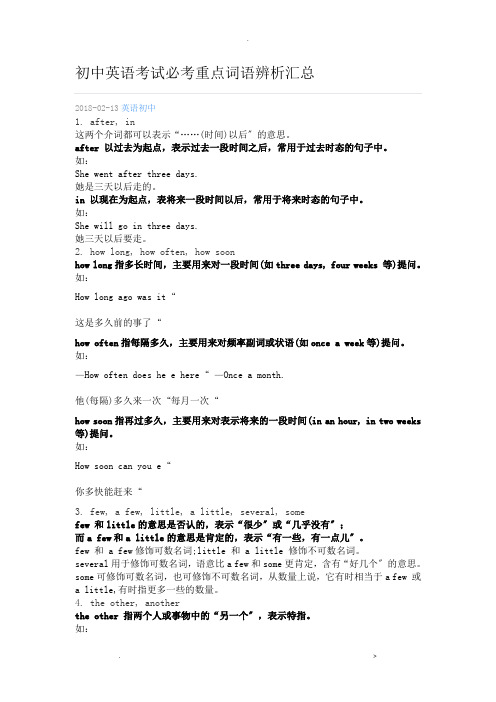
初中英语考试必考重点词语辨析汇总2018-02-13英语初中1. after, in这两个介词都可以表示“……(时间)以后〞的意思。
after 以过去为起点,表示过去一段时间之后,常用于过去时态的句子中。
如:She went after three days.她是三天以后走的。
in 以现在为起点,表将来一段时间以后,常用于将来时态的句子中。
如:She will go in three days.她三天以后要走。
2. how long, how often, how soonhow long指多长时间,主要用来对一段时间(如three days, four weeks 等)提问。
如:How long ago was it“这是多久前的事了“how often指每隔多久,主要用来对频率副词或状语(如once a week等)提问。
如:—How often does he e here“—Once a month.他(每隔)多久来一次“每月一次“how soon指再过多久,主要用来对表示将来的一段时间(in an hour, in two weeks 等)提问。
如:How soon can you e“你多快能赶来“3. few, a few, little, a little, several, somefew 和little的意思是否认的,表示“很少〞或“几乎没有〞;而a few和a little的意思是肯定的,表示“有一些,有一点儿〞。
few 和 a few修饰可数名词;little 和 a little 修饰不可数名词。
several用于修饰可数名词,语意比a few和some更肯定,含有“好几个〞的意思。
some可修饰可数名词,也可修饰不可数名词,从数量上说,它有时相当于a few 或a little,有时指更多一些的数量。
4. the other, anotherthe other 指两个人或事物中的“另一个〞,表示特指。
最全初中阶段形近词、近义词词义辨析汇总

英语初中阶段形近词、近义词词义辨析知识定位就像汉语的同义词、近义词一样,英语中有一些词语有相同或者相近的意思,但它们的用法却可能有很大的区别,在中考试卷中考查这些词语的试题有一定的比例,经常出现在单项选择和完形填空题中,虽然题目不很多,但同学们往往因为这些词语很容易混淆,或者因受思维定式的影响而出现错误,造成失分比较严重的现象。
掌握一些很容易混淆的词语辨析,了解一些近义词和同义短语的不同用法对于参加中考的同学来说是非常重要的和必须的,所以我们在这里详细讲解一些中考中经常考到的词语辨析。
由于中考考察较多的是近义词辨析,对于形近词,我们在此只列出相关重点词汇,供学生联想记忆。
知识梳理一、常考的易混淆词汇:1. 表示“花费”的动词:cost,spend,pay 和take。
2. 表示“借”的动词:borrow,lend 和keep。
3. 表示“到达”的动词:arrive,get 和reach。
4. 表示“穿衣服”的动词:dress,put on,和wear。
5. 可译成“看”的动词:look,see,read 和watch。
6. 表示“携带”的动词:bring,take,carry 和fetch。
7. 表示“死亡”的单词:die,dead,death 和dying。
8. 表示“说话”的动词:speak,say,talk 和tell。
9. 与“寻找”有关的词语:look for ,find 和find out。
10. 表示“听”的动词:listen,listen to 和hear。
11. 表示“输赢”的动词:lose,fail,beat 和win12. 表示“参加”的动词:join,attend 和take part in。
13. 表示“变化”的连系动词:turn,get,grow 和become。
14. 与“落下、丢失”有关的动词:lose, forget 和leave15. 表示“穿过”的介词:across 和through16. 表示数量的little, a little, few, a few17. –ing 形容词和-ed 形容词二、常考的易混淆短语:1. have/ has gone to 和have/ has been to2. used to 和be used to3. a number of 和the number of4. would like 和like5. maybe 和may be6. go on doing 和go on to do7. too much 和much too三、中考常考重点易混单词详解:1. 表示“花费”的动词:cost,spend,pay 和take。
初中英语重点短语考点辨析

初中英语重点短语考点辨析考点短语解析1. fill/ fullⅠ.fill为及物动词,表“使……满”,常与介词with搭配,表达“被……充满”时用be filled with结构。
如:① The bottle is filled with water. 这只瓶子装满了水。
② He was filled with joy at the news. 听到这个消息,他内心充满了喜悦。
Ⅱ.full是形容词,多作表语,表示主语所处的状态,常见于be full of 结构中。
如:① The schoolbag is full of books. 书包里装满了书。
② He drew in an old badsket full of sand.他捞上来一个灌满泥沙的旧蓝子。
[注]:be filled with = be full of .可以互换。
但介词with与of 不能混淆。
如:The room is full of people. = The room is filled with people.2. final/ lastⅠ.final表终止或结束之意,有时带有决定性或结论性等意味。
如:① Today is the final day of this term. 今天是本学期的最后一天。
② We shall know the final results of the elections tomorrow. 明天我们将知道选举的最后结果。
Ⅱ.last “最后的、末尾的”指按次序的前后或时间的先后居于最后,并意味着后面不再有了。
如:① My house stands in the last row.② He was the last one to enter.3. finally/ at last/ in the end这三个都可以作“最后”讲,但用法不同。
Ⅰ.finally表动作的发生顺序是在“最后”,无感情色彩,只用于过去时,它居句首时较多。
初中英语常用词语辨析完整版
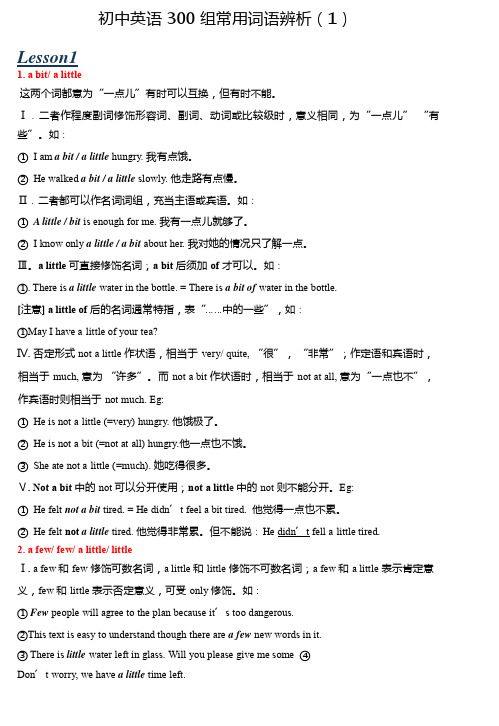
初中英语 300 组常用词语辨析(1)Lesson11. a bit/ a little这两个词都意为“一点儿”有时可以互换,但有时不能。
Ⅰ.二者作程度副词修饰形容词、副词、动词或比较级时,意义相同,为“一点儿”“有些”。
如:①I am a bit / a little hungry. 我有点饿。
②He walked a bit / a little slowly. 他走路有点慢。
Ⅱ.二者都可以作名词词组,充当主语或宾语。
如:①A little / bit is enough for me. 我有一点儿就够了。
②I know only a little / a bit about her. 我对她的情况只了解一点。
Ⅲ。
a little 可直接修饰名词;a bit 后须加of 才可以。
如:①. There is a little water in the bottle. = There is a bit of water in the bottle.[注意]a little of后的名词通常特指,表“……中的一些”,如:①May I have a little of your tea?Ⅳ. 否定形式 not a little 作状语,相当于very/ quite, “很”,“非常”;作定语和宾语时,相当于much, 意为“许多”。
而not a bit 作状语时,相当于not at all, 意为“一点也不”,作宾语时则相当于not much. Eg:①He is not a little (=very) hungry. 他饿极了。
②He is not a bit (=not at all) hungry.他一点也不饿。
③She ate not a little (=much). 她吃得很多。
Ⅴ. Not a bit中的not 可以分开使用;not a littl e 中的not 则不能分开。
Eg:①He felt not a bit tired. = He didn’t feel a bit tired. 他觉得一点也不累。
- 1、下载文档前请自行甄别文档内容的完整性,平台不提供额外的编辑、内容补充、找答案等附加服务。
- 2、"仅部分预览"的文档,不可在线预览部分如存在完整性等问题,可反馈申请退款(可完整预览的文档不适用该条件!)。
- 3、如文档侵犯您的权益,请联系客服反馈,我们会尽快为您处理(人工客服工作时间:9:00-18:30)。
单词辨析(形近义异)
此类词语辨析多见于听力、单项选择、完形填空、阅读理解,区分清楚,避免书写错误以及张冠李戴
1) quite 相当;quiet 安静地
2) bear 熊;bare 赤裸的
3) angel 天使;angle 角度
4) dairy 牛奶厂;diary 日记
5) content 内容, 满足的; context 上下文;contest 竞争, 比赛
6) principal 校长, 主要的;principle 原则
7) dessert 甜食;desert 沙漠、荒凉的
8) police 警察;policy 政策;politics 政治
9) sweet 甜的;sweat 汗水
10) later 后来;latter 后者;latest 最近的;lately adv 最近
11) costume 服装;custom 习惯; customer 顾客
12) protest 抗议;protect 保护
13) abroad 国外;aboard 上(船,飞机)
14) champion 冠军;champagne 香槟酒;campaign 竞选、战役
15) story 故事;storey 楼层;store 商店
16)except 除了expect 期望;respect 尊敬;
aspect 方面;suspect 怀疑
17) pray 祈祷;prey 猎物
18) chicken 鸡;kitchen 厨房
19) chore 家务活;chord 和弦
20) contract 合同;contrast 对照
21) does 做(三人称);dose 一剂药;doze 打盹; dozen 一打
22)steal 偷;steel 钢
23) statue 塑像;status 地位
24) widow 寡妇;window 窗户
25) tax 税;taxi 出租车
26)vocation 职业;vacation 假期
27) march 三月,前进;match 比赛
28)price 价格;prize 奖品
29) station车站;stationery 文具;stationary 固定的
30) recent 最近;resent 生气
词组辨析(形近义异)
约定俗成,谨慎使用,常见于单项填空、完形填空、阅读理解等(1)used
used to do sth 过去常常做某事
I used to get up at six in the morning我过去常常六点起床
be used to doing sth习惯于
I am used to getting up early.我习惯早期
be used to do sth被用来做某事
Pens are used to write.钢笔被用来写字
(2)chair
take a chair 坐下=sit down
take the chair开始开会
(3)get+介词
get on 上车get off下车get through 通过、度过
get over 克服get in 陷入get along进展、和睦相处(4)
too much+ 不可数名词太多
We have too much homework to do every day.
much too +adj/adv ( 原级) 太.....
He eats too much food, so he is much too fat.
(5)cut+介词
cut down砍倒cut down trees
cut up 切碎Cut up the carrots before you put them into the pot.
cut off切断;中断I was cut off on my line to London.
cut out删除
cut through穿透cut through the wall
(6)sea
go to sea当海员,出航
by sea乘船,由海路go by sea
by the sea在海边
(7)介词+class
in class 在课上
in the class在班级里 He is the best student in the class. (8)go+介词
go on继续go out 过时
go off 熄灭go up上升
(9)put +介词
put on 穿上put out 熄灭put off 推迟put away 抛弃(10)take +介词
take on穿上take in 参加take out 取出
take off 脱;起飞take up 开始从事、占据
(11)turn +介词
turn on打开turn off 关闭turn out 结果是:证明是turn up 调大声音turn down调小声音turn over 移交(12)
a few有少许(肯定且可数)few几乎没有(否定且可数)
a little 有少许(肯定且不可数)little 几乎没有(否定且不可数)(13)give+介词
give in屈服give out 分发、筋疲力尽
give up 放弃give away泄露
(14)make+介词
make out 理解make off 离开make up化妆make over 转让(15)look+介词
Look up 查找look for 寻找
Look through 浏览Look into 观察。
